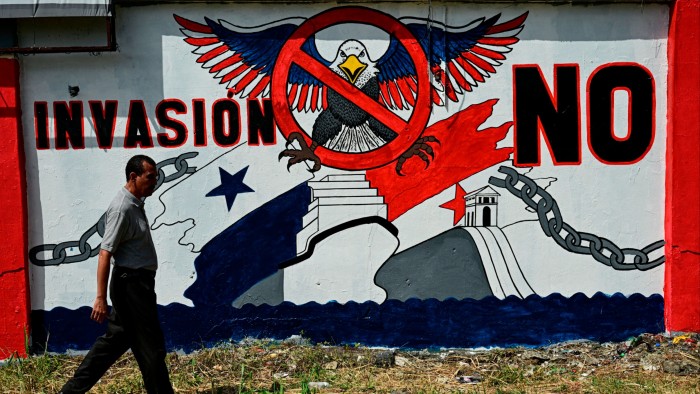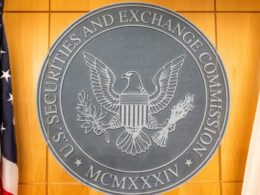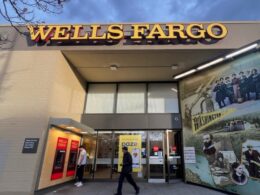Panama traded on a reputation as a solid US ally and thriving hub for global business — until US President Donald Trump took office demanding the return of the shipping canal built by the Americans more than a century ago.
Now the Central American nation, whose cultural links with the US include a passion for baseball, is reeling at its portrayal in Washington as a corrupt rogue state in cahoots with Iran and China that seeks to rip off the US at every turn.
Caught in a fierce geopolitical battle, Panama’s predicament offers a taste of what could happen to other nations that have profited from globalisation and hoped to stay neutral, if they fall foul of Washington’s anti-China mood.
US secretary of state Marco Rubio claimed to a US radio station this week that China could potentially “shut down the Panama Canal” in any conflict. Ahead of a trip to Panama this weekend, he added: “And in fact, I have zero doubt that they have contingency planning to do so. That is a direct threat.”
Trump claimed in a social media post on Christmas Day that the “wonderful soldiers of China” were “lovingly but illegally operating the Panama Canal” and has pledged to take back the waterway, using force if necessary. He has since repeated that threat, including in a post-inauguration speech.
Panama’s conservative pro-business president, José Raúl Mulino, has described the claims of Chinese military control as “nonsense”, insisted the waterway “is and always will be Panama’s” and signalled a willingness to engage in dialogue — but nobody in Washington appears to be listening.
“Even as it takes advantage of the global maritime system, Panama has emerged as a bad actor,” Republican senator Ted Cruz said as he opened a committee hearing on the Panama Canal this week. “Panama has for years flagged dozens of vessels in the Iranian ‘ghost fleet’, which brought Iran tens of billions of dollars in oil profits to fund terror across the world.”
Panama’s government and business elite are beginning to panic, diplomats said, as they realise that although Trump’s rhetoric may be flamboyant, the US president and his allies are serious about pressing their tiny country to make concessions and reduce China’s presence — even if it means tearing up legally binding agreements.
“They just don’t know what to do,” one envoy said of Mulino’s government. “They have been holding nonstop meetings trying to work out what Trump really wants.”


Complicating Panama’s efforts to counter Trump’s accusations is the country’s poor record on corruption and its growing embrace of China after it broke off diplomatic relations with Taiwan in 2017 in order to establish relations with Beijing. It also joined the Belt and Road infrastructure initiative.
When attacking Chinese influence, US critics of Panama have focused on two ports at either end of the canal which are run by Hutchison Ports, an arm of Hong Kong-listed conglomerate CK Hutchison Holdings, under long concessions. They were renewed without a bidding process in 2021 for 25 years.
The broader group rose to prominence before the UK handed Hong Kong back to China in 1997; it operates 53 ports in 24 countries including the UK and Germany. The ports in Panama have a nearly 40 per cent market share, and the country launched an audit of the licences after Trump’s inauguration.
Also in Panama, Chinese state-controlled companies have built a huge convention centre close to the mouth of the canal and are constructing a new bridge over the waterway and a cruise ship port, contracts that were secured through bidding processes. Beijing was seeking to build a big new embassy on land near the canal until US objections killed the scheme.

Panama also planned to negotiate a free trade deal with China this year, though its status is now unclear.
“If there’s one thing a divided Washington agrees on, it’s that we’re anti-China,” said a former Trump administration official. “What Trump is really saying is that China exerts an undue influence on the canal through operating ports at both ends, and that’s real.”
China has insisted Panama’s independence is “not negotiable” and the canal “is not under direct or indirect control by any power”. “We respect Panama’s sovereignty over the canal and recognise it as a permanently neutral international waterway,” foreign ministry spokesperson Mao Ning said this month.

As for Cruz’s Iran accusations, Panama’s maritime authority in 2023 cancelled the registration of 136 Panamanian-flagged vessels after finding they had a “direct link” to Iran’s national oil company.
Transparency International ranks Panama 108th in the world in its most recent Corruption Perceptions Index, equal with Sierra Leone, and its score has deteriorated recently.
Panamanian officials insist their country has cleaned up its act in recent years, but it spent many years on international blacklists for money laundering and was the centre of the 2016 “Panama Papers” scandal, when a huge data leak from a Panamanian law firm exposed billions of dollars of offshore assets hidden from tax and law enforcement.
“What we’re dealing with is really systematic historic corruption that nobody’s really called out,” Louis Sola, the Trump-appointed chair of the US Federal Maritime Commission, told the Financial Times.
Referring to Tuesday’s senate hearing on Panama, he said: “We identified very clearly that there’s some sweetheart deals going on . . . As a competition regulator, we have to look at that.”
Mulino was the protégé of former president Ricardo Martinelli, a billionaire who tapped him as a candidate after he was barred from running again in last year’s election following a money-laundering conviction. Martinelli is sheltering under diplomatic protection in the Nicaraguan embassy in Panama.
Trump’s business has had its own vexed encounter with Panama: the Trump Organization managed a hotel in the country but the arrangement acrimoniously collapsed in 2018, amid a legal dispute, when the owners evicted his company from the building.
Uncomfortable in the spotlight and unaccustomed to running campaigns to win hearts and minds in Washington, Panama is not trying to fight a media battle with the US president.
Government ministers have been instructed to stay tight-lipped and Mulino’s comments have been limited to saying there will be no negotiation about the ownership of the canal.
Instead, myriad small Panamanian flags have been fixed to posts on major roads in the capital and on some pavements and buildings ahead of Rubio’s visit, in a quiet but determined show of nationalism.
“I think we have made a mistake in thinking that it doesn’t matter what [the Americans] say,” said Tony Chapman, an executive and former head of Panama’s business lobby Conep who formerly worked at US group Gillette.
“Now it’s time to start to set the record straight. We have to do it in writing, with publications, and above all because in this war of disinformation what needs to prevail is well-sourced information.”
He added: “Why would I be looking at Iran and other countries? My vision has always been completely influenced by America. And my daughter studies in the United States.”
Source link









